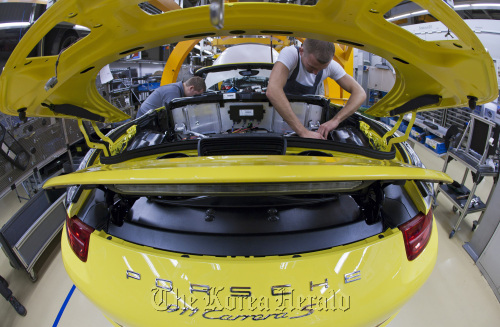European services and factory output strengthened in January, led by growth in Germany and France, as the region’s leaders sought a solution to the debt crisis.
A euro-area composite index based on a survey of purchasing managers in both industries rose to 50.4 from 48.3 in December, London-based Markit Economics said in a report Friday. January’s reading is unchanged from an initial estimate on Jan. 24. A reading above 50 indicates expansion.
Finance ministers of the “AAA” rated countries using the euro ― Germany, Luxembourg, the Netherlands and Finland ― are set to meet Friday in Berlin as European leaders try to end the region’s debt crisis. While the turmoil and cooling global export demand has undermined the recovery, business confidence has improved and European Central Bank President Mario Draghi has said 2012 will be a “much better” year.
 |
Employees work on a Porsche 911 Carrera S automobile as it travels along the production line inside the company’s factory in Stuttgart, Germany. (Bloomberg)Employees work on a Porsche 911 Carrera S automobile as it travels along the production line inside the company’s factory in Stuttgart, Germany. BloombergEmployees work on a Porsche 911 Carrera S automobile as it travels along the production line inside the company’s factory in Stuttgart, Germany. Bloomberg |
Friday’s data confirm that “business conditions stabilized following declines seen in the final four months of last year and that the region may avoid a slide back into recession,” Chris Williamson, chief economist at Markit, said in the report. “For the first quarter, gross domestic product for the region may well show a small gain.”
The euro strengthened after the report, rising 0.2 percent to $1.3171 as of 10:45 a.m. in Frankfurt.
Manufacturing and services growth accelerated to a seven- month high in Germany and a five-month high in France, while contractions in Spain and Italy eased, Markit said. A composite gauge of euro-region services rose to 50.4 in January, up from 48.8 in December.
German business confidence jumped to a five-month high in January. The Ifo institute’s business climate index, based on a survey of 7,000 executives, climbed to 108.3 from 107.3 in December, the group said on Jan. 25. The report adds to data that the country has shaken off a probable economic contraction in the fourth quarter.
Still, the euro-area economy may struggle to gather strength after expanding just 0.1 percent in the third quarter as governments from Ireland to Spain step up spending cuts to help restore investor confidence. European unemployment remained at the highest in almost 14 years in December, suggesting the region’s debt crisis and cooling economic growth has prompted companies to cut jobs.
The euro-area economy will probably expand 0.3 percent this year after growing 1.6 percent in 2011, the ECB said on Dec. 8, when cutting borrowing costs a second time in as many months. The central bank has offered banks unlimited loans for three years to prevent a credit crunch.
European Central Bank council member Ewald Nowotny said on Jan. 30 that the euro area may fail to grow or show a “recession in certain phases” of this year.
“Anecdotal evidence from survey respondents indicates that much of the improvement appears to be based on business and consumer confidence reviving, in the belief that the worst of the region’s debt problems are behind us,” Markit’s Williamson said. “As such, the outlook remains very much dependent upon further progress in resolving the crisis.”
Friday’s gathering of finance ministers is part of a series of meetings convened by officials from the highest-rated euro states, a German Finance Ministry spokesman said, speaking on the customary condition of anonymity. Ministers will discuss current issues without briefing reporters after the meeting.
‘Ultra-Difficult’
Greece is seeking a second international bailout, which European officials and Greek creditors say may be wrapped up in coming days. Luxembourg Prime Minister Jean-Claude Juncker said yesterday that Greek bond-swap talks with private creditors are “ultra-difficult,” and the steps to tackle the debt crisis adopted at a summit on Jan. 30 were “largely insufficient.”
Royal Philips Electronics NV, the world’s largest light bulb maker, said on Jan. 30 that it is “cautious” about prospects for 2012 after writedowns and sluggish sales helped spark its biggest loss in a decade. “Europe is not a great place for growth right now.” Philips Chief Executive Officer Frans van Houten said at the time.
“I am confident that the euro will be in better shape in 2012,” Draghi said on Jan. 19. “I look at the progress that has been achieved on the two root causes of the situation, namely lack of fiscal discipline and lack of structural reform.”
(Bloomberg)








